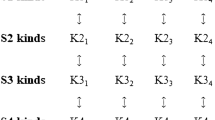Abstract
The paper examines an alleged distinction claimed to exist by Van Gelder between two different, but equally acceptable ways of accounting for the systematicity of cognitive output (two “varieties of compositionality”): “concatenative compositionality” vs. “functional compositionality.” The second is supposed to provide an explanation alternative to the Language of Thought Hypothesis. I contend that, if the definition of “concatenative compositionality” is taken in a different way from the official one given by Van Gelder (but one suggested by some of his formulations) then there is indeed a different sort of compositionality; however, the second variety is not an alternative to the language of thought in that case. On the other hand, if the concept of concatenative compositionality is taken in a different way, along the lines of Van Gelder's explicit definition, then there is no reason to think that there is an alternative way of explaining systematicity.
Similar content being viewed by others
References
ClarkA. (1993), ‘Minimal Rationality’, Mind 102, 587–610.
ClarkA. (1994), Associative Engines, Cambridge, Massachusetts: MIT Press.
DaviesM. (1991), ‘Concepts, connectionism, and the language of thought’, in W.Ramsey, S.Stich and D. E.Rumelhart (eds.), Philosophy and Connectionist Theory, Hillsdale, New Jersey: Lawrence Erlbaum Associates.
DennettD. (1978): ‘Brain writing and mind reading’ and ‘A cure for the common code,’ in Brainstorms, Cambridge, Mass.: MIT Press.
FodorJ. (1987): Psychosemantics, appendix “Why there still has to be a language of thought,” Cambridge, Mass.: MIT Press.
FodorJ. and PylyshynZ. (1988), ‘Connectionism and cognitive architecture: A critical analysis,’ Cognition 28, 3–71.
FodorJ. and McLaughlinB. (1990), ‘Connectionism and the problem of systematicity: Why smolensky's solution doesn't work,’ Cognition 35, 183–204.
García-CarpinteroM. (1993/4), ‘The supervenience of mental content,’ Proceedings of the Aristotelian Society XCIV pp. 117–135.
García-CarpinteroM. (1994), ‘Dretske on the causal efficacy of meaning,’ Mind and Language 9(2), 181–202.
García-Carpintero, M. (forthcoming), ‘The philosophical import of connectionism: A critical notice of Andy Clark's Associative Engines’, to appear in Mind and Language.
McLaughlinB. (1993), ‘The connectionism/classicism battle to win souls, Philosophical Studies 71, 163–190.
SmolenskyP. (1988), ‘On the proper treatment of connectionism’, Behavioral and Brain Sciences 14, 1–74.
SmolenskyP. (1991), ‘Connectionism, constituency and the language of thought,’ in B.Loewer and G.Rey (eds.), Fodor: Meaning and Mind, Oxford: Basil Blackwell, 201–227.
VanGelderT. (1990), ‘Compositionality: A connectionist variation on a classical theme’, Cognitive Science 14, 355–384.
Author information
Authors and Affiliations
Additional information
This paper has its origin in very helpful and stimulating discussions with Pepa Toribio. I would like to express my gratitude also to Ned Block, Josep Corbí, Joe Lau, Begoña Navarrete, David Pineda, Ignacio Vicario and an anonymous referee for Minds and Machines for valuable comments that led to improvements. A previous version of the paper was presented at the third conference of the European Society for Philosophy and Psychology held in Paris, 1–4 September 1994, where I benefited from comments by G. Rey and J. Higginbotham. Finally, I thank Michael Maudsley for his careful revision of the grammar. Research for this paper has been funded by the Spanish Government's DGICYT, Ministry of Education, as part of the research project PB93-1049-C03-01.
Rights and permissions
About this article
Cite this article
García-Carpintero, M. Two spurious varieties of compositionality. Mind Mach 6, 159–172 (1996). https://doi.org/10.1007/BF00391284
Issue Date:
DOI: https://doi.org/10.1007/BF00391284




